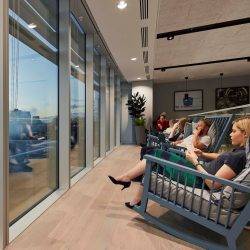January 25, 2017
Physical spaces should be designed to support the digital workplace 0
In an era in which the digital workplace is just as prevalent as the physical office, organisations that create spaces, technologies and social networks specifically focused on enabling more collaborative work, perform above their direct competitors in their respective industries – in employee connectedness and responsive leadership. This is according to research conducted by Nick van der Meulen of Rotterdam School of Management, Erasmus University (RSM) and MIT’s Center for Information Systems Research (CISR). The report assessed on a basis of five indicators, including growth in market share, profit growth and employee satisfaction, and found that trusting employees by giving them autonomy is the key to making a success of the digital workplace. The survey of 313 organisations showed that the high-performing organisations have an integrated and company-wide approach to greater employee connectedness.


































January 17, 2017
The very idea of a universal workplace is seriously flawed 0
by Kyle Pinto • Comment, Flexible working, Technology, Workplace design
(more…)